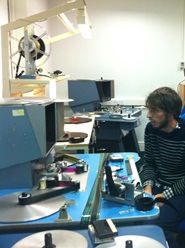History
A Short History of the UK’s Film Archives (2013)

Film Archives UK represents the professional interests of the public sector film archives in the UK. Before 2011, it was known as the Film Archive Forum (FAF). Established in 1987 with the object of fostering an informal network of British moving image archives, four archives sent representatives to the first meeting. Today FAUK’s membership includes all of the national and regional film archives in the UK aswell as Individual Members. Full membership is open to film and television archives established for public benefit. Associate members are from allied organisations who support the objects of FAUK.
FAUK takes an interest in all the archival aspects of the moving image. It has particular interests in preservation (film, videotape and digital files), the digitisation of analogue film & video, analogue and digital storage, curation, resource development, online delivery, the training of archivists, copyright & licensing, entrepreneurialism, archive standards and collaboration with the international archive community.

The oldest members of the FAF / FAUK are the Imperial War Museum Film Archive, which dates back at least to 1920, and the BFI National Archive, which was founded in 1935 as a division of the British Film Institute. The next creation of a national public film archive came forty years later, when in 1976 what is now the National Library of Scotland’s Moving Image Archive was established by the Scottish Film Council. In 1989, the Wales Film & Television Archive was set up in Aberystwyth under the auspices of the Welsh Arts Council and in April 2001 the WFTA and the National Library of Wales’ Sound and Moving Image Collection merged to form the National Screen & Sound Archive of Wales.
1976 also saw the creation of the first of the regional film archives, with the formation of the East Anglian Film Archive in Norwich. This was followed in 1977 by a research project based at Manchester Metropolitan University which led to the creation of the North West Film Archive. Over the next two decades, regional archives emerged across England: the Yorkshire Film Archive (1984), Wessex Film and Sound Archive (1988), Screen Archive South East (1992), South West Film & Television Archive (1993), North East Film Archive (1998) and the Media Archive for Central England (2000).

With the imminent completion of the archive network, it became clear that the FAF needed to raise its profile as a body representing best practice in UK moving image archiving, and as an advisor on national archive policy. At its meeting in December 1998, it was proposed that the FAF should give itself, “a clear voice and a set of principles.” The result was the document Moving History, which was published in April 2000 and still underpins the work of FA UK. This work contributed directly to the Hidden Treasures conference on audiovisual archives of 2002 and the subsequent strategy paper of 2004.
The next significant step in the organic development of a national film archive strategy was the creation in 2004 by the British Film Institute and the UK Film Council of the UK Film Heritage Group. Its members were drawn from the regional and national film archives (all members of the FAF), the Museums, Libraries & Archives Council, the National Council on Archives, Screen England and the Department for Culture, Media & Sport. Its work culminated in a new strategy for the sector, entitled the Strategy for UK Screen Heritage (2007) It made the case for new national investment in the BFI and the regional film archives. This proposition was accepted by Government and from 2009-11 over £20m was invested in the sector. This was the first award of its kind for the screen heritage / film archive sector.

In 2012, with the BFI having replaced the UK Film Council as the national agency for film, the BFI launched a second screen heritage development programme – Unlocking Film Heritage. Dedicated to digitisation, digital delivery and curation, the programme ran from 2013 to 2017.
The BFI’s current 5 years strategy – BFI2022 is focused on building more on screen heritage development.
Film Archives UK and its members have worked and will continue to work closely with the BFI to support these national film / screen heritage initiatives and provide an important platform for understanding what it is to be a film archive in the early twenty-first century and how best to work together as an effective sector.
Luke McKernan / Frank Gray


